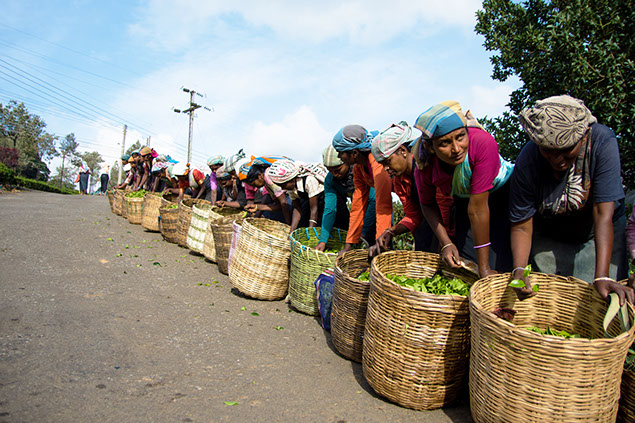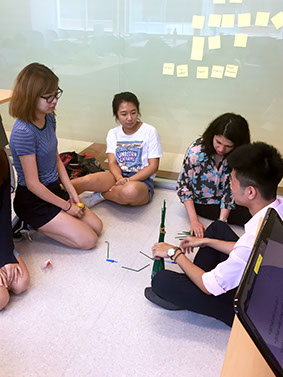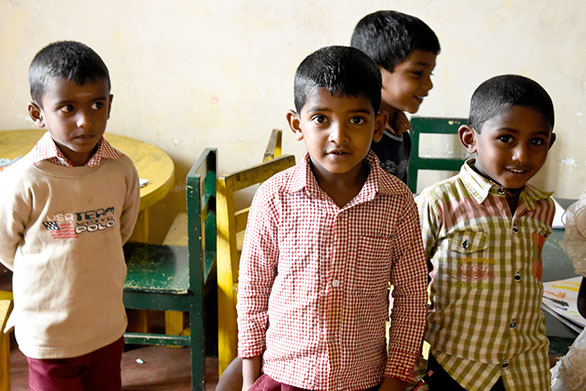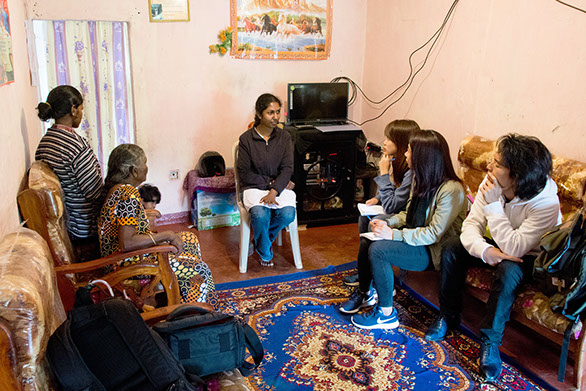
The only exposure to malnutrition that most people in the developed world will have is through the media – typically, sad images of children with swollen bellies, stick-like limbs and rib cages poking out. So when a group of HKU students ventured to Sri Lanka tea plantations last summer, they had to rub their eyes in disbelief.
They were told more than 30 per cent of the children there were malnourished – yet they had none of the supposedly tell-tale signs. Instead, many had hidden malnutrition in the form of Vitamin A deficiencies and anaemia that would affect their long-term health and development.
The students were so surprised by what they saw that they produced a short video to educate the public about this form of malnutrition. They also produced a booklet on the problem and recommended solutions.
“Families living on tea villages are poor but the core factor leading to their malnutrition problems is that they are not equipped with the knowledge to effectively allocate resources, such as money, health supplements and food, to maintain health. They stick with traditional health practices which are sometimes harmful and they do not eat nutritious meals regularly,” said third-year Bachelor of Social Sciences student, Harmony Chan Ying-tung.
Harmony and 10 other students spent seven weeks in Sri Lanka collecting information for a long-term project by Save the Children to improve maternal and child health on tea plantations, producing marketing materials on this including the video and booklet, and looking at ethical considerations of the fair trade certification of tea and the living conditions of workers.
![]() The big take-away that all the students reported was the interpersonal bonding. Of course they learned a lot about fair trade and so on, but it was the bonding with a group of people they might not otherwise meet that stood out.
The big take-away that all the students reported was the interpersonal bonding. Of course they learned a lot about fair trade and so on, but it was the bonding with a group of people they might not otherwise meet that stood out. ![]()
Ms Elsa Lam
Unusual combination
The programme was supported by the Gallant Ho Experiential Learning Fund and organised by Ms Elsa Lam in the Faculty of Social Sciences as part of its Social Innovation and Global Citizenship Internship programme, and Dr Jason Ho Ka-hang of the Department of Comparative Literature as part of its internship programme. It was an unusual combination of disciplines for experiential learning but there was a need for both community outreach and story-telling abilities.
Expectations and reality
The encounters also included people at the top of the tea trade. Sri Lanka’s tea board, which regulates tea practices in the country and includes industry representatives, invited the students to present the marketing materials they had produced. The board then screened its own marketing video, which was glossier than the students’ work and showed a more promotional side of the tea trade.
“We had to debrief the students afterwards to point out that after all, this is a commercial business. This was part of their learning, too, because there are always going to be expectations and reality,”
Dr Ho said. “There are a lot of key stakeholders at play, so these issues are not as easy as you might think.”
Students also gained some skills, in particular how to ask questions – “when to ask open-ended questions, when to ask yes / no questions and when not to ask anything and just let people speak,” Dr Ho explained. A Journalism student in her final year helped her teammates in this.
Ms Lam said the project would continue this year, focussing this time on child protection and dental oral health. Students from the Faculty of Dentistry will be invited to join. “We will also gather data on the progress of the maternal and child health project. It will take years to see improvement,” she said.
In the meantime, the marketing materials produced by the students last summer are bearing fruit as they are used to help Save the Children raise funds for its work in Sri Lanka.
The students received one week of training, where they learned about all aspects of the tea trade including the business side, before heading to Sri Lanka. They travelled to different tea estates where they interviewed workers and their families, managers and other stakeholders. The interviews were videotaped and photographed.
“The most memorable part was doing interviews with the mothers,” Harmony said. “It reflected how big a difference knowledge could make. Families with mothers who were knowledgeable in healthcare obviously maintained better health than those whose mothers knew very little.”
Ms Lam said that across the board, “the big take-away that all the students reported was the interpersonal bonding. Of course they learned a lot about fair trade and so on, but it was the bonding with a group of people they might not otherwise meet that stood out.”
Students received one week of training learning about all aspects of the tea trade before heading to Sri Lanka.
Children under five years old are put in Child Development Centres (CDCs) during the day as a safe and secure place to stay when their parents are out for work.
Children under five years old are put in Child Development Centres (CDCs) during the day as a safe and secure place to stay when their parents are out for work.

Down On The Farm In
Sri Lanka
Living conditions on a Sri Lankan tea plantation were the focus of an experiential learning project for 11 Social Sciences and Comparative Literature students, whose output supported the work of the Save the Children organisation.
Next
A lot of women in Sri Lanka start to work as tea pluckers after finishing their compulsory education at the age of 18.





